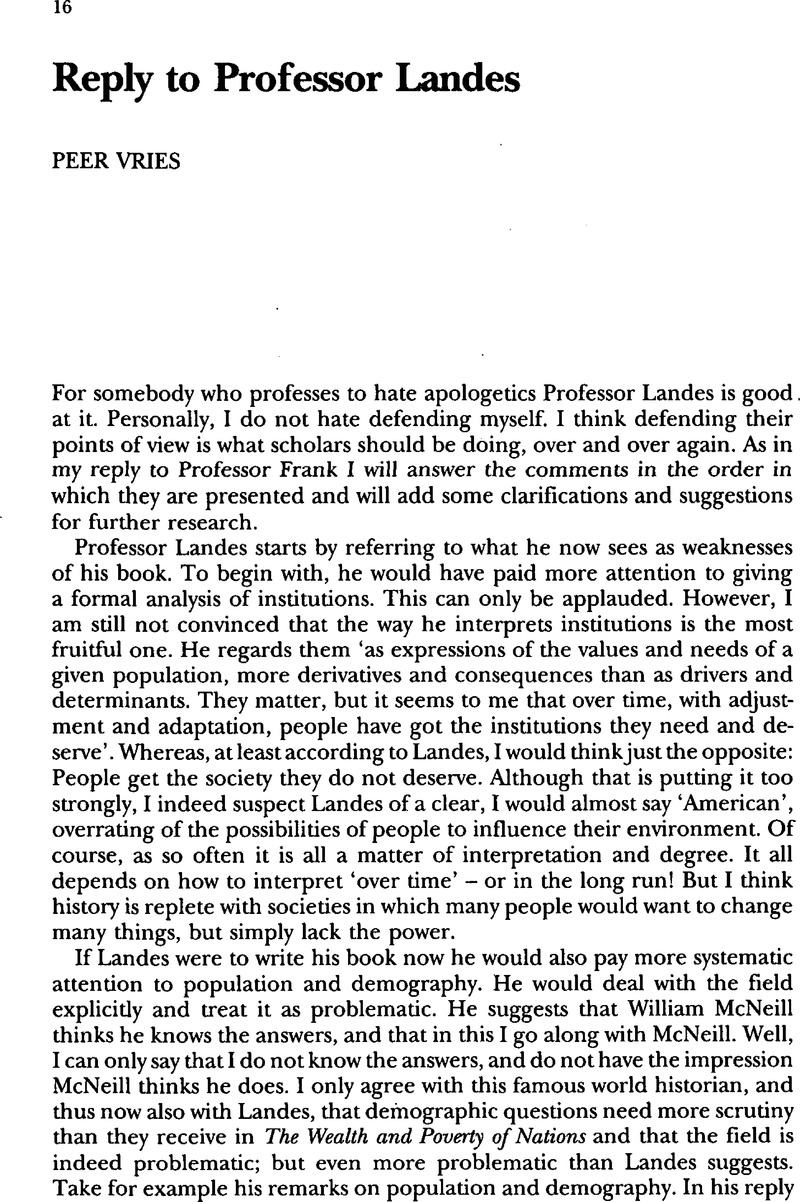No CrossRef data available.
Article contents
Abstract

- Type
- Reactions from our Readers
- Information
- Copyright
- Copyright © Research Institute for History, Leiden University 1999
References
Notes
1 For a comparison of demographic trends in China and Europe see Lavely, W. and Wong, R. Bin, ‘Revising the Malthusian Narrative: the Comparative Study of Population Dynamics in Late Imperial China’, The Journal of Asian Studies 57/3 (1998) 714–748CrossRefGoogle Scholar.
2 For a comparison and analysis of demographic developments in Japan and England see Macfarlane, A., The Savage Wars of Peace: England, Japan and the Malthusian Trap (Oxford 1997)Google Scholar.
3 See for example Osterhammel, J., China und die Weltgesellschaft: Vom 18. Jahrhundert bis in unsere Zeit (München 1989) 70 and 78–80Google Scholar; and Fairbank, J.K. and Goldman, M., China: A New History (Enlarged Edition; Cambridge Mass, and London, 1998) 239Google Scholar: ‘The old reasoning of K.A. Wittfogel (1957) and others that the need for central control of water resources was responsible for the inevitable rise of an all-powerful Chinese state can now be turned on its head and applied to the rise of power among the local gentry. This critical community resource had to be managed in each case according to local circumstances and could not be imposed from a distance. Along with management responsibilities came a degree of autonomy and power. So quickly are simplistic theories undone!’ Honesty requires to say that they are referring to the situation in the nineteenth century. Merle Goldman is an expert on China as Landes himself states in his reply. Debeir and the authors Landes quotes in his defence are not.
4 Bairoch, P., Révolution industrielle et sous-développement (The Hague 1979) 140–143Google Scholar; and Maddison, A., Chinese Economic Performance in the Long Run (Paris 1998) 27–33CrossRefGoogle Scholar.
5 Lee, J., ‘Trade and Economy in Preindustrial East Asia, c. 1500 - c. 1800: East Asia in the Age of Global Integration’, The Journal of Asian Studies 58/1 (1999) 2–26, 18–19CrossRefGoogle Scholar.
6 de Vries, J., ‘The Industrial Revolution and the Industrious Revolution’, Journal of Economic History 54 (1994) 249–270CrossRefGoogle Scholar. This concept, by the way, had already been used before by Japanese historians.
7 See Peyrefitte, A., L'Empire immobile, ou, le Choc des Mondes (Paris 1989) 367Google Scholar. Compare for other remarks on the extreme diligence of the Chinese ibid., 53, 68–69 and 281–282.
8 Elvin, M., The Pattern of the Chinese Past (Stanford 1973)Google Scholar; Huang, Ph.C.C., ‘The Paradigmatic Crisis in Chinese Studies: Paradoxes in Social and Economic History’, Modern China 17/3 (1991) 299–341CrossRefGoogle Scholar; Myers, R.H., ‘How did the Modern Chinese Economy develop? - A Review Article’, The Journal of Asian Studies 50/3 (1991) 604–621CrossRefGoogle Scholar; Huang, Ph.C.C., ‘A Reply to Ramon Myers’, The Journal of Asian Studies 50 (1991) 629–633CrossRefGoogle Scholar; and Wong, R. Bin, ‘Chinese Economic History and Development: A Note on the Myers-Huang Exchange’, The Journal of Asian Studies 51 (1992) 600–611CrossRefGoogle Scholar.
9 Landes, D.S., The Wealth and Poverty of Nations: Why Some Are so Rich and Others so Poor (Londen 1998) 389Google Scholar.
10 See note 8.
11 Landes, The Wealth and Poverty of Nations, 232.
12 Ibid., 522.
13 See for example the very interesting Weiss, L. and Hobson, J.M., States and Economic Development (Cambridge 1995)Google Scholar.
14 Elvin, M., Another History: Essays on China from a European Perspective (Broadway Australia 1996) 1Google Scholar.
15 Ladurie, E. Le Roy, Les paysans de Languedoc (Paris 1966)CrossRefGoogle Scholar; Goubert, P., Beauvais et le Beauvaisis de 1600 à 1730: contribution à la histoire sociale de la France du siecle XVII (Paris 1960)Google Scholar.
16 Landes, The Wealth and Poverty of Nations, 537.
17 Parthasarathi, ‘Rethinking Backwardness in the Eigteenth Century’.
18 Landes, The Wealth and Poverty of Nations, 23. Landes speaks only of ‘China’, where I would suggest ‘Asia’.


